新概念2-lesson3
新概念英语第二册第三课(包含课文及完整课后练习)
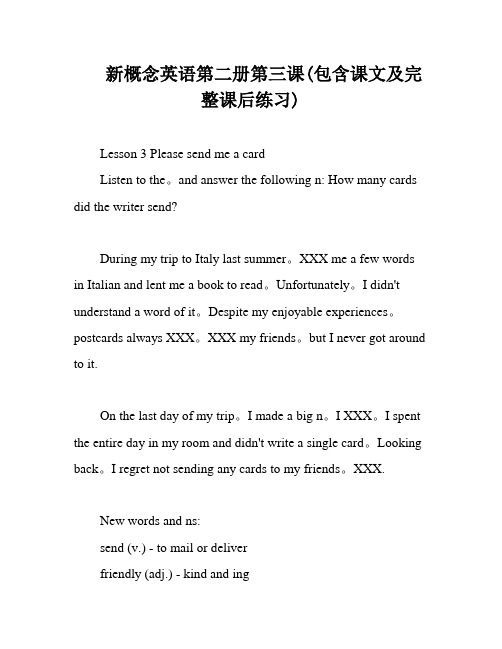
新概念英语第二册第三课(包含课文及完整课后练习)Lesson 3 Please send me a cardListen to the。
and answer the following n: How many cards did the writer send?During my trip to Italy last summer。
XXX me a few words in Italian and lent me a book to read。
Unfortunately。
I didn't understand a word of it。
Despite my enjoyable experiences。
postcards always XXX。
XXX my friends。
but I never got around to it.On the last day of my trip。
I made a big n。
I XXX。
I spent the entire day in my room and didn't write a single card。
Looking back。
I regret not sending any cards to my friends。
XXX.New words and ns:send (v.) - to mail or deliverfriendly (adj.) - kind and ingpostcard (n.) - a card for sending a message by mailwaiter (n.) - a person who XXXspoil (v.) - to ruin or damagelend (v.) - to give something to someone for a short d of timemuseum (n.) - a place where objects of historical。
新概念英语第二册 Lesson 3
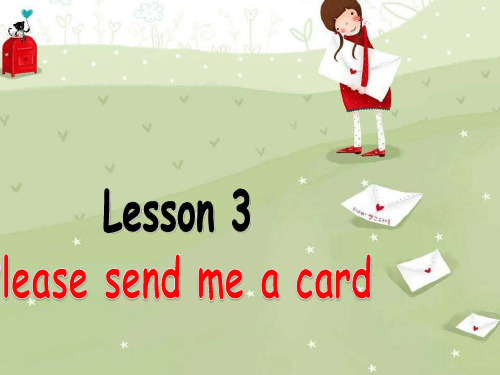
single 单一的 ←→ double 双倍的 single 单身的 ←→ married已婚的
and complete the summary writing!
Postcards always spoil my holidays. Last summer, I went to Italy. I visited museums and sat in public gardens.A friendly waiter taught me a few words of Italian. Then he lent me a book. I read a few lines, but I did not understand a word. Every day I thought about postcards. My holidays passed quickly, but I did not send cards to my friends. On the last day I made a big decision. I got up early and bought thirty-seven cards. I spent the whole day in my room, but I did not write a single card!
• in public 公开的 • in private 私自的,私下里的
Let’s have a conversation in private.
③ n. 公众,群众,大众
the public 公众,民众
The museum is open to the public on Sunday.
5. friendly adj. 友好的
新概念英语第二册lesson-3
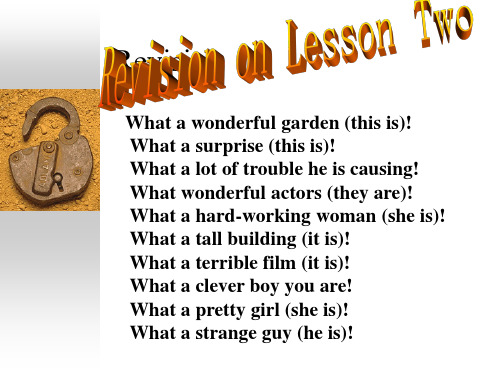
以上三个是指物理上的破坏, 而spoil主要指精神 上
Lend (lent) (lent ) v. 借出
lend sth.to sb=lend sb.sth. Can you lend 50 yuan to me? lend me your ears. 请听过我说。
public house简称pub : 酒吧 ; public place 公共场所. public lavatory ['lævətɔri】 公厕
in public:公开的; in private:私下里的 Let’s have a conversation in private. 让我们私下谈谈? Why not has a conversation in public? 为什么不公开谈呢?(当面说呢?)
Pair discussion!
Now, imagine you are having a trip overseas. And you only have 1, only 1, postcard. Who do you want to send to?
Now, everyone have 3 minutes to tell your partner. Let’s begin!
Germany German
Ireland Irish
Brazil
Brazilian
America American
Greece Greek
Canada Canadian
Australia Australian
新概念英语第二册Lesson 3

Lesson 3 Please send me a cardPhrase:1. in public gardends 在公园里2. on the last day 在最后一天3. every day 每天4. make a decision 决定5. think about 想到,想6. not a single 连一个都没有Intensive Reading:1.but是连词,用来连接两个简单句,表示转折关系,它前面一般要用逗号点开。
but决不能与(al)though连用,注意中英文的区别。
eg. She was tired, but she went to work. (√) Although she was tired, but she went to work. (×) 2.spend 花费,度过,经常与on连用。
eg. Roy spent a lot of money on records.spend 常用句型为:spend…doing/ on sth. eg. He’s spent half his life writing this book.3.think about 意为“考虑”,think后不能直接加名词作宾语,而要借助合适的介词。
eg. think about a question 想问题,think of you 想你。
但think后加句子时不需介词,eg. I think he will come soon.4.make a big decision 意为“下大决心”,英语中make和take是两个搭配能力很强的动词,后接名词可组成许多不同的词组,但一般来说make和take不可互换使用,而分别与一定的名词搭配。
eg. make the bed, take a rest .Key Structure:1.一般过去时:A. 用法:描述已经执行和完成了的行为动作,但与现在的情况没有联系,而且必须跟确切的时间状语连用。
新概念英语第2册课程讲义Lesson3
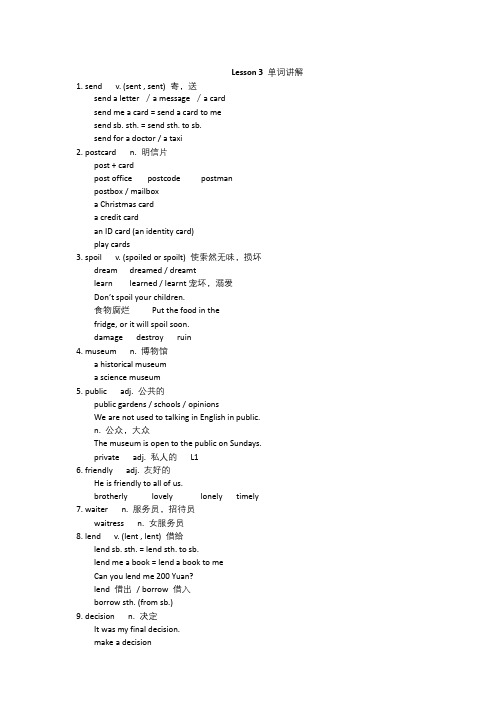
Lesson 3 单词讲解1. send v. (sent , sent) 寄,送send a letter /a message /a cardsend me a card = send a card to mesend sb. sth. = send sth. to sb.send for a doctor / a taxi2. postcard n. 明信片post + cardpost office postcode postmanpostbox / mailboxa Christmas carda credit cardan ID card (an identity card)play cards3. spoil v. (spoiled or spoilt) 使索然无味,损坏dream dreamed / dreamtlearn learned / learnt 宠坏,溺爱Don’t spoil your children.食物腐烂Put the food in thefridge, or it will spoil soon.damage destroy ruin4. museum n. 博物馆a historical museuma science museum5. public adj. 公共的public gardens / schools / opinionsWe are not used to talking in English in public.n. 公众,大众The museum is open to the public on Sundays.private adj. 私人的L16. friendly adj. 友好的He is friendly to all of us.brotherly lovely lonely timely7. waiter n. 服务员,招待员waitress n. 女服务员8. lend v. (lent , lent) 借给lend sb. sth. = lend sth. to sb.lend me a book = lend a book to meCan you lend me 200 Yuan?lend 借出/ borrow 借入borrow sth. (from sb.)9. decision n. 决定It was my final decision.make a decisiondecide v. 决定decide to do sth.I decided to go abroad for further education.10. whole adj. 整个的a whole day / weekA Whole New Worldwhole milk11. single adj. 唯一的,单一的a single bed / ticketLesson 3 课文&语法讲解1. 一般过去时形式:V.过去式(did)用法:Last summer I went to Italy.Mary and I __________ (talk) about your book hours ago.They __________ (have) a meeting yesterday.Tom __________ (be) a student when he was ten years old. 一般过去时形式:V.过去式(did)用法:Last summer I went to Italy.注意:She had a boyfriend.Tom was a student.一般过去式V.过去式(did)否定/疑问You were happy.You were not happy.Were you h appy?They had a meeting.They did not have a meeting.Did they have a meeting?一般过去式V.过去式(did)补充:V.原形V.过去式V.过去分词look looked looked teachtaguht taughtgo went gonewrite wrote written2. … I went…3. … I visited… and sat …4. A friendly waiter taught…5. … he lent…6. Then he lent me a book.= Then he lent a book t o me.主谓双宾She gave me a book. =?I cooked him a meal. =?He sold them all his flowers. =?Pass me the salt please. =?7. I read a few lines, but I did not understand…read read readunderstand understood understood8. Every day I thought about…every day / everyday9. I got up early and bought…get got got/gottenget up early/late stay up latebuy bought bought10. I spent the whole day in my room…spend time / money + on sth./(in) doing sth.Lesson 3 知识拓展1. spoil 超纲词汇2. public adj. / n. 都在考纲范围一般过去时怎么考?1 过去的时间2 过去的动作(时态)3 上下文的语意(无过去)The three of us ______ around Europe for about a month last summer.A. travelledB. have travelledC. had travelledD. travel( 天津12)The three of us ______ around Europe for about a month last summer.A. travelledB. have travelledC. had travelledD. travel( 天津12)-Did you ask Sophia for help?-I ______ need to – I managed perfectly well on my own.A. wouldn’tB. don’tC. didn’tD. won’t( 全国14)-Did you ask Sophia for help?-I ______ need to – I managed perfectly well on my own.A. wou ldn’tB. don’tC. didn’tD. won’t( 全国14)I was out of town at the time, so I don’t know exactly how it ______.A. was happeningB. happenedC. happensD. has happened( 山东34)I was out of town at the time, so I don’t know exactly how it ______.A. was happeningB. happenedC. happensD. has happened( 山东34)When I got on the bus, I ______ I had left my wallet at home.A. was realizingB. realizedC. have realizedD. would realize( 山东31)When I got on the bus, I ______ I had left my wallet at home.A. was realizingB. realizedC. have realizedD. would realize( 山东31)-Kevin, you look worried. Anything wrong?-Well, I ______ a test and I’m waiting for the result.A. will takeB. tookC. had takenD. take( 重庆22)If you don’t like the drink you ______, just leave it and try a different one.A. orderedB. are orderingC. will orderD. had ordered( 全国9)-What do you think of the movie?-It’s fantastic. The only pity is that I ______ the beginning of it.A. missedB. had missedC. missD. would miss( 浙江20)。
新概念英语第二册 Lesson3 (共25张PPT)

• 3)decide / make up one’s mind 区 别
• decide 指经过考虑对疑难问题、争 端等做出决断,含有下决心取舍的 意思。decide 后常接动词不定式和 从句。
• make up one’s mind 指毫不犹豫的 做出决定,意味着“打定主意,下 定决心”。后常接动词不定式,一 般不接从句。
New words
1.send v. 送 派送 send sth. to sb. / send sb. sth 送给某人某物 nd a letter 寄信
send / take 区别: take 强调某人亲自送; take sth to sb 给某人送某物 send 则是通过第三人去送
与send搭配的常用短语
5.single 1)唯一的,单一的: 反义词 double
2)未婚的,独身的: 反义词 married 已婚的
• 6.postcard n. 明信片 卡片 • 有关card词组: • ID card身份证 • credit card信用卡
• 7.museum n. 博物馆 • 扩展: • the Palace Museum 故宫 • the Summer Palace颐和园 • the science museum 科学博物馆
现在进行时:
1.概念:表示现阶段或说话时正在发生的动作或行为。
2.结构:肯定句: 主语+ am/is/are + Ving + 其他. 否定句: 主语+ am /is/are +not + Ving + 其他. (1.在am/is/are后加not. 2.some → any)
一般疑问句:Am/Is/Are+主语 +Ving + 其他 ?
新概念英语第二册课文Lesson3
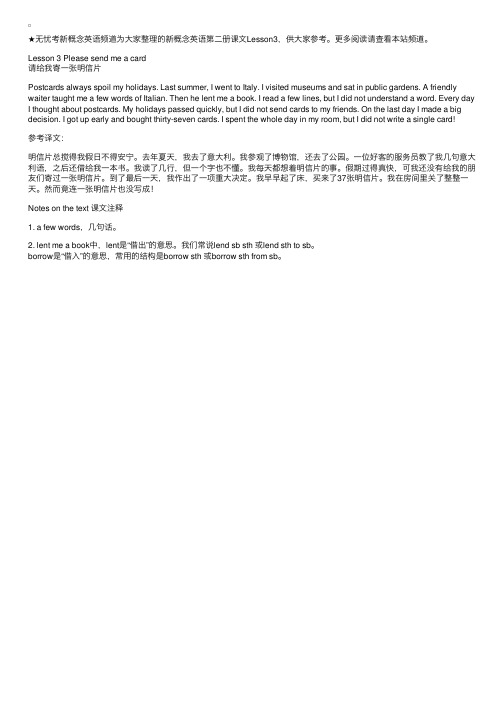
★⽆忧考新概念英语频道为⼤家整理的新概念英语第⼆册课⽂Lesson3,供⼤家参考。
更多阅读请查看本站频道。
Lesson 3 Please send me a card请给我寄⼀张明信⽚Postcards always spoil my holidays. Last summer, I went to Italy. I visited museums and sat in public gardens. A friendly waiter taught me a few words of Italian. Then he lent me a book. I read a few lines, but I did not understand a word. Every day I thought about postcards. My holidays passed quickly, but I did not send cards to my friends. On the last day I made a big decision. I got up early and bought thirty-seven cards. I spent the whole day in my room, but I did not write a single card!参考译⽂:明信⽚总搅得我假⽇不得安宁。
去年夏天,我去了意⼤利。
我参观了博物馆,还去了公园。
⼀位好客的服务员教了我⼏句意⼤利语,之后还借给我⼀本书。
我读了⼏⾏,但⼀个字也不懂。
我每天都想着明信⽚的事。
假期过得真快,可我还没有给我的朋友们寄过⼀张明信⽚。
到了最后⼀天,我作出了⼀项重⼤决定。
我早早起了床,买来了37张明信⽚。
我在房间⾥关了整整⼀天。
然⽽竟连⼀张明信⽚也没写成!Notes on the text 课⽂注释1. a few words,⼏句话。
新概念2 Lesson_3_Please_send_me_a_card

New words and expressions
friendly adj. waiter n. lend v. whole adj. single adj. 友好的 服务员 借给 整个的 唯一的,单一的
词组
New words and expressions
1. send sth. to sb. send a letter to sb. send children to school =take children to school 2.send sb. sth. send sb. a letter
Kiki SHEN 81 XX Street XX Road Wuxi City, J.S. Province
Key structure
1.带有确定的过去时间状语时,要用过去时
如:yesterday(昨天)、two days ago…(两 天前…… )、last year…(去年…)、the other day(前几天)、once upon a time(过去曾经)、 just now(刚才)、in the old days(过去的日子 里)、before liberation(解放前…)、 When I was 8 years old(当我八岁时…)、at+一个时间点
Language point
Italy [ 'i t ə l i ] n. 意大利 重音 在第一个音节上 Italian[ i 't æ l jə n ] adj. 意大利的 重音在第二个音节上 引申: Canada/Canadian 加拿大
Language point
比较下列用法: He lends me a pen./ He lends a pen to me. I borrow a pen from him.
新概念第二册课件 lesson3(共53张PPT)

Everyday I thought about postcards.
• Think vi. 不及物动词 • Let me think. Let me think about/of it. “考
虑” • Think about/of=concern/consider sth • We are thinking of how to use English in
所有同学都参加了昨天的数学考试。
Questions on the text
★ Watch a video
1. Where did the writer spend his holiday last summer?
He went to Italy
2. Why didn’t he enjoy his holidays?
★single
adj. 单身的, 单程的, 单一的
• a single bed单人床 • a single ticket单程票 • single 单一的←→ double 双倍的 • single 单身的←→married已婚的
The National Museum of China
British Museum
• 我吃了个苹果,喝了杯可乐。
• (2) teach sb. sth. • He teaches our English.(错) • He teaches us English.(对) • (3) last summer里的last表示 “上一个” • last:表示 “上一个” 或 “最后一个” ,
Listen to the tape and answer the question: How many cards did the writer send ?
新概念英语第二册Lesson3

Notes on the Text
Postcards always spoil my holidays. Last summer, I went to Italy. last: ① adj. 上一个 last summer里的last表示 “上一个” 上周日你干什么了? What did you do last Sunday?
2.Every day I thought about postcards. think about/of 考虑, 思考 你觉得天气怎么样? What do you think of the weather today? think of 想到 你想到什么了? What do you think of? think over 仔细考虑,反复思考
borrow v. 借
borrow sth. from sb. 不能用 borrow sb. sth. (×) 他昨天借了我的笔。 He borrowed a pen from me yesterday. 如果我们使用信用卡这意味着我们从银行借 钱。 If we use credit cards it means that we borrow money from the banks.
On the whole 总的来说,一般来讲 总的来说,我同意你的决定。 On the whole, I agree with your decision. 总的来说,我部分同意这个观点。 On the whole, I agree with this opinion to some extent.
My holidays passed quickly, but I did not send cards to my friends. Pass 1)经过 我们经过该镇而未停留 We passed the town without stopping. 2)<时间>经过,过去 自从他前往法国, 已过了两年 Two years has passed since he left for France. 许多年已经过去了我仍记得这个有趣的故事 Many years has passed I still remember the interesting story.
新概念英语第二册课件 Lesson 3
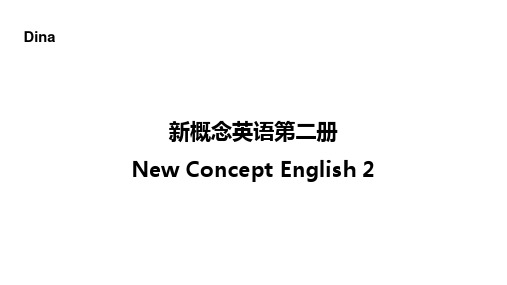
Dina
New Words and Expressions
museum [mju:'ziəm] n. 博物馆
Palace Museum 故宫
public ['pʌblik] adj.公共的;公立的,公营的
① 公共的 public places 公共场所 ② 公开的 public letters 公开信 in public 公开 ③ 公立的 public school 公立学校 ④ n. 公众 The museum is open to the public on Sundays.
lend-lent-lent lend sb. sth.= lend sth. to sb.
borrow (借入) borrow sth. from sb.
Dina
New Words and Expressions
decision [di'siʒən] n.决定
decide v.决定 make/arrive at/reach/come to a decision 做一个决定 make/arrive at/reach/come to a decision to do sth. 决定做某事 =decide to do sth.
A friendly waiter taught me a few words of Italian.
teach ①teach sb. sth.=teach sth. to sb. ② teach sb. to do sth . word have a word with sb.与某人聊几句 have words with sb. 与某人吵架
whole [həul] adj.整个的
as a whole总体上 on the whole 总的来说
新概念英语第二册Lesson3课件
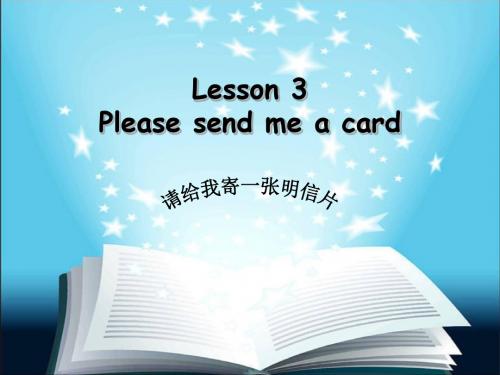
Explain the text
• 1)a little Italian:语言不可数,所以要用 a little Italian 或 a few words of Italian
• a little / little / a few / few 的区别: • a little / a few 都用肯定句,分别表示“有一点”和“有几
• v. 损坏,破坏 (主要指精神上) • 过去式,过去分词:spoiled or spoilt
Don't let him spoil your night The bad weather spoiled my mind • v. 宠坏,溺爱 He is a spoiled child. She spoiled her son by giving him too much money.
个”,但 a little 修饰不可数名 • 词;a few 修饰可数名词复数 • little / few 都用否定句,分别表示“没有多少”和“没有
几个”,但 little 修饰不可数名词; • few 修饰可数名词复数
2) teach sb.sth. = teach sth. to sb. lend sb. sth. = lend sth. to sb. send sth. to sb. = send sb. sth 双宾语 英语中许多动词带两个宾语,即直接宾语和间接宾语。 间接宾语通常是人,直接宾语通常是物。 例如:He lent me a book. = He lent a book to me. He bought me a book. = He bought a book for me. 间接宾语人在后面时,其前必须加间接宾语人在后面时,其
新概念2 lesson-3课件 (共55张PPT)

• 2. postcard n. 明信片
(1) card 卡片/贺卡 a get-well card an identity card a pack of cards
•Intensive reading
Notes on the text 课文注释
• teach v. • (1) teach sb. sth.
teach sb to do sth teach oneself
e.g. Could you teach me a little English? Who taught you to swim? Nobody. I just taught myself.
初识浊化,急速练习:
[sp]-> [sb]最清晰 sports/ speak/ space [st] -> [sd]最快速 stand/ stop/ start [sk] -> [sg]最慢速 sky/ skirt/ school [str] -> [sdr]最大声 street/ stream/ strict
A friendly waiter _______ me a few words of Italian. Then he _______ me a book. I _______ a few lines, but I did not understand a word.
Everyday I _______ about postcards. My holidays _______ quickly, but I did not send cards to my friends.
for class.
Cultural Tips
新概念英语2-lesson-3
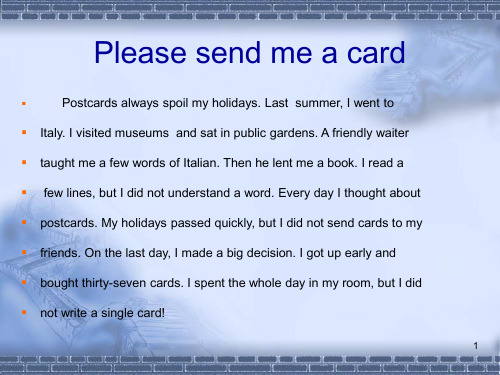
11
Language point
▪ Italy [ 'i t ə l i ] n. 意大利 ▪ 重音 在第一个音节上 ▪ Italian[ i 't æ l jə n ] adj. 意大利的 ▪ 重音在第二个音节上 ▪ 引申:
▪ 否定① was/were not ② didn’t+v
▪ 疑问① was/were+ 主 ② did+主+V
24
Key structure
▪ 一般过去时口诀
▪
一般过去时并不难,表示过去动作、状态记心间。
▪
动词要用过去式,时间状语句末站。
▪
否定句很简单,didn't 站在动词原形前,其它部分不要变。
4
New words and expressions
▪
postcard
name card=visiting card 名片
ID(identity) card
身份证
credit card [ 'kredit ] 信用卡
cash card [ kæʃ ]
现金卡
password(s)
密码
5
New words and expressions
▪
一般疑问句也好变,did放在句子前,主语、动词原形、其它部分依
▪
次站。
▪
特殊疑问句也简单,疑问词加一般疑问句记心间。
▪
最后一条请注意,动词过去式要牢记。
25
▪ 欢迎大家多提意见和建议☺
▪
程洁 管理学院
新概念2Lesson3 教研版课件 (共37张PPT)

双宾语
主语+ 间接宾语(表示动作目标(人))+直接宾语(表示动作 结果(物))
主语+直接宾语+ to/for + 间接宾语 to-- 表示动作对什么人而做 for-- 表示动作为什么人而做
• Please send me a card . • He lent me a book. • He passed me the salt.
第三课 请给我寄一张明信片
• 参考译文 • 明信片总搅得我假日不得安宁。去年夏天,我
去了意大利。我参观了博物馆,还去了公园。 一位好客的服务员教了我几句意大利语,之后 还借给我一本书。我读了几行,但一个字也不 懂。我天天都想着明信片的事。假期过得真快, 可我还没有给我的朋友们寄过一张明信片。到 了最后一天,我作出了一项重大决定。我早早 起了床,买来了37张明信片。我在房间里关了 整整一天。然而竟连一张明信片也没写成!
Tell the story
1. Postcards -- spoil -- holidays. 2.summer-- Italy. 3.museums -- sat -- gardens 4. waiter --few words -- Italian 5.lent -- book--lines-- understand 6. Everyday -- thought -- postcards 7. holidays -- quickly-- not send cards --friends 8. last day -- decision. 9. early -- thirty-seven cards 10. whole day -- room-- not--single card
• Please send a card to me. • He lent a book to me. • He passed the salt to me.
- 1、下载文档前请自行甄别文档内容的完整性,平台不提供额外的编辑、内容补充、找答案等附加服务。
- 2、"仅部分预览"的文档,不可在线预览部分如存在完整性等问题,可反馈申请退款(可完整预览的文档不适用该条件!)。
- 3、如文档侵犯您的权益,请联系客服反馈,我们会尽快为您处理(人工客服工作时间:9:00-18:30)。
各种卡片的英文说法
• birthday card 生日卡 • Christmas card 圣诞卡 • New-Year card 新年卡 • Identity card 身份证 • preferential card 优惠卡 • student card 学生证 • score card 积分卡 • membership card 会员卡 • intelligence card IC智能卡 • entry card 入境卡
• Postcards always spoil my holidays. Last summer, I went to Italy. I visited museums and sat in public gardens.
• last: • ① adj. 上一个 • last summer里的last表示 “上一个” • ② adj. 最后一个, • 表示“最后一个”时要加冠词the • the last day 最后一天 (具体到一天及一天的早中晚都要用on)
single /sɪŋgl/
1)唯一的,单一的:反义词 double There wasn’t a single bus in the stree a single room 一间单人房 a single mother 一位单身母亲
2)未婚的,独身的:反义词 married 已婚的 She is still single now.
Lesson 3 Please send me a card.
New words and expressions:
New words and expressions:
send /send/
1)send sth. to sb. / send sb. sth
send a letter 寄信 类似的用法还有 give, take, pass, read, sell... 2)send / take children to school
Postcards always spoil my holidays. Last summer, I went to Italy. I visited museums and sat in public gardens. A friendly waiter taught me a few words of Italian. Then he lent me a book. I read a few lines, but I did not understand a word. Every day I thought about postcards. My holidays passed quickly, but I did not send cards to my friends. On the last day I made a big decision. I got up early and bought thirty-seven cards. I spent the whole day in my room, but I did not write a single card!
waiter n. 服务员, 招待员
waiter(男服务员), waitress(女服务员) • chief waiter 领班 • I want to see the chief waiter. • 我要见你们的领班。 • shop assistant 商店里的店员 • attendant n. (其他公共场所的)服务员
• 语言不可数, 所以要用a little Italian或a few words of Italian
• I can speak a little English/a few words of English.
• Every day I thought about postcards. My holidays passed quickly, but I did not send cards to my friends. On the last day I made a big decision. I got up early and bought thirty-seven cards.
send / take 区别: take 强调某人亲自送; send 则是通过第三人去送 Tom’s father sends him to school every day. Mary took her son to school yesterday.
postcard
• 1)postcard=card • 2)ID card身份证 credit card信用卡 cash
spoil /spɔɪl/
• v. 损坏,破坏 (主要指精神上) • 过去式,过去分词:spoiled or spoilt
Don't let him spoil your night. The bad weather spoiled my mind. • v. 宠坏,溺爱 He is a spoiled child. She spoiled her son by giving him too much money.
• A friendly waiter taught me a few words of Italian. Then he lent me a book. I read a few lines, but I did not understand a word.
• teach sb. sth. 教某人做某事 He teaches us English.
public /'pʌblik/
• 1)应该:public school / place / house
• 2)反义词:private
• 3)短语:in private 私下里的
•
in public 公开的
• Why not have a conversation in public?
• We are good friends in private.
